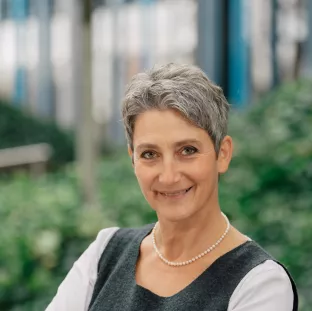Communications and Marketing
H-BRS aktuell: "The ability to repair must be relearned"
H-BRS: Ms. Meilinger, you research and teach on the subject of life cycle assessment. Can you briefly explain what this is about?
Stefanie Meilinger: We carry out what are known as life cycle analyses. We look specifically at a product, such as a coffee machine or a computer keyboard, and examine the environmental impact of this product - throughout its entire life cycle, from manufacture to use to disposal.
H-BRS: How exactly does that work?
Meilinger: The first step is to break a product down into its individual parts and determine their weight. Then we consider how these parts were manufactured and what materials were used. We also look at how the product has been used and what happens to it if it breaks. Using existing data, we can then calculate on the computer what impact the product has on the climate, for example. In the next step, we can then make comparisons: What happens if I replace one of the components, or if my toaster is not in a German household but a Swedish one?
„Our analyses have shown that most of the environmental impact occurs in the household during the use phase.”
Stefanie Meilinger - Professor for Sustainable Technologies

H-BRS: Why do national borders play a role in the life cycle assessment?
Meilinger: It's not about the countries themselves, but about their electricity mix, for example. In Sweden, the proportion of renewable energy is significantly higher than in Germany. For products that remain in a household for many years, this has a huge impact on their environmental footprint. Our analyses have shown that most of the environmental impact occurs during the use phase in the household. Private individuals can therefore make an important contribution to climate protection by opting for green electricity.
H-BRS: With the "right to repair", the European Union now wants to ensure that repairing products is worthwhile again, as opposed to throwing them away and buying new ones. How useful is this for their environmental footprint?
Meilinger: It's quite clear: every new product has to be manufactured first. We therefore need new raw materials, consume energy during production and transportation and energy must also be used to recycle the broken appliance. Very often, only comparatively small repairs with a low material cost are necessary to extend the service life of the product, such as replacing a defective switch. So if it is possible to repair something, it is always more sustainable than buying a new one.
„Repair skills and knowledge need to be trained more intensively again”
Stefanie Meilinger
H-BRS: So the EU requirement makes sense from your point of view?
Meilinger: Yes. You should first try to repair a broken appliance. If it can't be repaired at all, then you can start to recycle the materials. Then we will have a real circular economy. However, it is clear that legal regulations are not enough to ensure that more is repaired.
H-BRS: What do you mean by that?
Meilinger: The skills and knowledge required for repairs need to be trained again. Manufacturers also need to make it possible to repair their products again. But I also see it as our duty as a university to teach our students how products can be improved in terms of their environmental impact. In addition to the necessary specialist knowledge, this also requires a certain amount of creativity. This can and must also be taught.
The "right to repair"

Kontakt

Stefanie Meilinger
Professor for Sustainable Technologies, esp. Energy Efficiency and Renewable Energies, Director of the International Centre for Sustainable Development (IZNE), Department Engineering and Communication (IWK)
Research fields
Location
Sankt Augustin
Room
F 321
Address
Grantham-Allee 20
53757 Sankt Augustin
Telephone
+49 2241 865 718